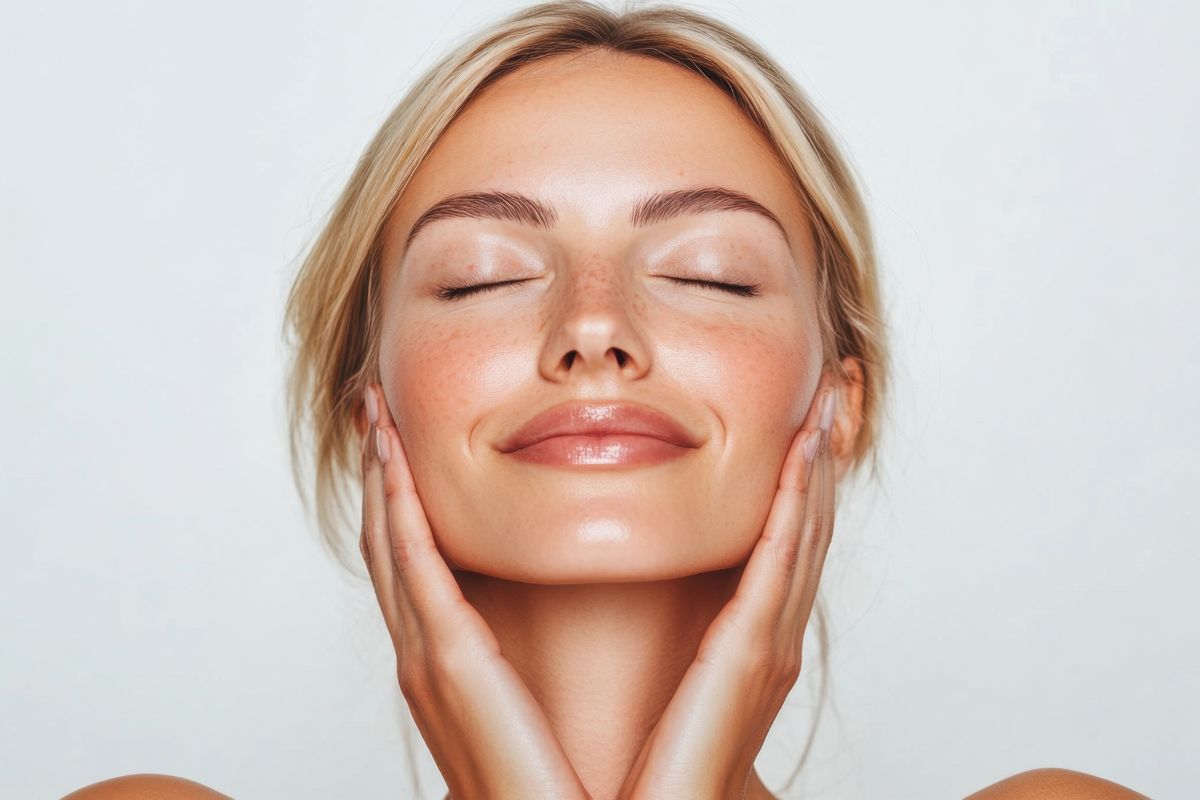A radiant complexion isn’t just about serums and creams – it reflects your overall health and habits. In fact, experts say “your skin serves as a mirror reflecting your overall health, and what you eat directly may influence its vitality”. A balanced lifestyle – including diet, sleep, hydration and stress management – builds the foundation for vibrant skin. Clinical dermatology research even notes that maintaining healthy skin can slow aging and boost confidence. In short, glowing skin starts from the inside out.
Daily Skincare Habits
A simple, consistent daily routine is key to keeping skin healthy. Dermatologists emphasize three non-negotiable steps: cleanse, moisturize and protect. For example:
-
Cleanse gently each evening (and as needed in the morning). Removing makeup, sunscreen, dirt and sweat at night prevents clogged pores and breakouts. If you wear heavy makeup or sunscreen, consider a double cleanse: start with an oil-based cleanser or micellar water, then follow with a mild foaming wash. In the morning, you may only need a splash of water or gentle rinse – avoid stripping your skin of all oils.
-
Moisturize to lock in hydration. After cleansing, use a moisturizer suited to your skin type (gel, lotion or cream). This keeps the skin’s barrier strong and plump. Even oily skin benefits from lightweight hydration, since dehydration can trigger more oil production. Many experts recommend ceramide- or hyaluronic acid-based moisturizers to reinforce the skin’s barrier (these ingredients trap water in the skin).
-
Apply sunscreen daily. Sun protection is crucial: up to 80% of skin aging is due to UV exposure. Use a broad-spectrum SPF 30+ sunscreen every morning (and reapply if you’re outdoors). Sunscreen prevents premature wrinkles, dark spots and even skin cancer. Make it a habit: one dermatologist notes that UV damage is “behind photoaging, inflammation, and skin cancer”, so daily SPF is essential.
-
Listen to your skin’s needs. Don’t feel pressured to use a dozen products every day. Instead, tailor your routine to what your skin needs today. For example, on humid mornings you might skip a heavy cream, or if your skin feels parched you might add a soothing serum. The best routine is one you can stick to consistently.
Sticking to these basics – clean skin, adequate moisture and sun protection – will keep your complexion healthy and prevent dullness. (Even top brand routines often boil down to these three steps.)
Weekly and Occasional Skin Care
In addition to daily care, add a few gentle treatments once or twice a week to boost radiance:
-
Exfoliate mildly once a week. Over time, dead skin cells build up on the surface, making skin look dull. A light chemical exfoliant (like a mild AHA or BHA toner) or a very gentle scrub can clear away dead cells and brighten the skin. However, use scrubs with caution: avoid rough or gritty scrubs, which can cause micro-tears and worsen breakouts. Instead, opt for a mild alpha- or beta-hydroxy acid treatment a few times a week – it will slough off dull surface cells without irritating the skin.
-
Deep clean and mask. Once a week, consider a pore-clearing treatment: apply a clay or charcoal mask to draw out excess oil and impurities. A gentle oil massage or steam (just a few minutes) can also help loosen debris in the pores. Be careful not to pick or squeeze blemishes. Afterward, follow with a soothing hydrating mask (honey, aloe or a serum mask) to replenish moisture.
-
Self-care extras. Monthly, do a quick check of your routine: toss expired products, wash makeup brushes (at least weekly) and give your skin a “rest” day if needed. Consistency is important, but listen to your skin – for example, take a break from active ingredients if it becomes irritated.
By keeping up these weekly habits, you help your skin turnover naturally and maintain an even, smooth texture.
Sleep, Hydration and Nutrition
Beauty Sleep for Skin Repair
Never underestimate sleep for your skin. During deep sleep, the body boosts blood flow to the skin and triggers tissue repair. Conversely, chronic sleep loss can leave skin looking dull and tired. Dermatologists note that lack of sleep and dehydration are common causes of dark under-eye circles and a lackluster complexion. One Cleveland Clinic guide advises getting “at least seven hours of sleep each night to prevent shadows” under the eyes. Research shows that even a single poor night can make skin look less radiant. Aim for 7–9 hours of restful sleep nightly: this allows collagen production to peak and inflammation to drop, helping your skin stay elastic and clear. Establish a relaxing bedtime routine (cool dark room, limited screens) to support good sleep hygiene.
Hydration: Water and Moisture
Skin is about 64% water, so staying hydrated is fundamental. Drinking enough water helps maintain skin’s suppleness and elasticity. Aim for 6–8 cups (1.5–2 L) of fluids daily – plain water is best, but herbal teas or water-rich foods (cucumbers, watermelon) also count. Dehydration can make skin appear dry, tight and flaky – even contributing to dark circles. In addition to internal hydration, use hydrating skincare. Ingredients like hyaluronic acid serums and glycerin attract moisture into the skin. A weekly hydrating mask (gel masks with aloe vera or oatmeal) can boost moisture after exfoliation.
Nutrition: Eat for Your Skin
A skin-healthy diet is rich in antioxidants, healthy fats and lean protein. Foods loaded with vitamins A, C and E, plus antioxidants and omega-3 fats, help the skin in different ways:
-
Vitamins A, C and E: These vitamins support cell turnover and collagen. Vitamin A (from sweet potatoes, carrots, eggs) stimulates new skin cells and collagen production, helping reduce wrinkles. Vitamin C (from citrus, berries, bell peppers) is crucial for collagen synthesis and fights free radicals, promoting firmness. Vitamin E (from nuts, seeds, spinach) protects against environmental damage. Together, they help skin look smooth and even-toned.
-
Healthy Fats and Protein: Omega-3 fatty acids (in salmon, flaxseeds, walnuts) help maintain the skin’s lipid barrier and hydration. Protein (lean meats, tofu, beans) provides amino acids for collagen and elastin, the scaffolding that gives skin strength.
-
Antioxidant-rich fruits & veggies: Berries, leafy greens, carrots and other colorful produce are packed with antioxidants like beta-carotene and polyphenols. These combat oxidative stress from pollution and sun exposure, preventing premature aging. In short, a diet high in fruits, vegetables, whole grains and lean proteins – and low in processed sugar – yields visibly better skin.
Remember: limit sugar and processed foods, which can fuel inflammation and damage collagen fibers. Even small dietary changes (more greens, swapping soda for water) can brighten the complexion within a few weeks. In addition, avoid excessive alcohol and caffeine, which can dehydrate skin.
Natural vs. Product-Based Skincare
There’s room for both botanical remedies and scientifically formulated products in a glowing-skin routine. Natural ingredients often soothe or provide mild benefits, while targeted actives can deliver powerful results:
-
Natural ingredients: Many plant extracts have been shown to calm and protect the skin. For example, aloe vera gel is anti-inflammatory and moisturizing – studies have identified aloe vera as beneficial in soothing skin conditions. Other botanicals like green tea, turmeric or licorice root provide antioxidant protection and can help with redness or pigmentation. Using a pure aloe gel or a green tea mask a few times a week can calm irritation and add moisture without chemicals.
-
Science-backed actives: For stronger, faster effects, consider well-researched skincare ingredients:
-
Vitamin C (ascorbic acid) serum: A topical vitamin C is a potent antioxidant that “protects your skin from free radicals” and stimulates collagen production. It brightens the skin and fades dark spots by evening skin tone. Dermatologists recommend using 10–20% vitamin C serums in the morning (under SPF) to boost radiance.
-
Niacinamide (Vitamin B3): This multitasking nutrient strengthens the skin barrier, locks in moisture and reduces inflammation. It can visibly shrink pores, calm redness (helping acne and rosacea), and even out skin tone. Many moisturizers and serums contain 2–5% niacinamide for a brightening and firming effect.
-
Hyaluronic Acid: A hydrating powerhouse (humectant) that can hold 1000x its weight in water. Used as a serum, HA plumps and smooths by drawing moisture into the skin.
-
Retinoids (Vitamin A derivatives): Prescription or over-the-counter retinol speeds cell turnover, improving fine lines and texture. (Start slowly and use at night only, as retinoids can irritate new users.)
-
Sunscreen (mineral or chemical): Always a product staple. Using a daily SPF is one of the simplest yet most effective “anti-aging” steps.
-
Vitamin C serum applied with a dropper – a potent brightening and antioxidant treatment.
Above: Actives like vitamin C serum and niacinamide complement natural routines. For example, vitamin C applied topically leads to “better-looking skin” by neutralizing damaging free radicals and boosting collagen. Niacinamide in creams or serums helps skin retain moisture and fade dark spots. Meanwhile, a dab of aloe vera or a honey mask can soothe after sun exposure or exfoliation (both are naturally anti-inflammatory).
Tip: Whenever trying a new product or plant extract, do a patch test on the inner forearm first. Even natural ingredients can cause irritation in some people. The safest approach is combining “clean” ingredients (like aloe or green tea) with evidence-backed ingredients (vitamin C, niacinamide) in a balanced routine.
Lifestyle Changes to Reduce Dullness
Beyond routines and products, simple life changes can keep skin glowing:
-
Manage stress. Chronic stress floods your body with cortisol, which increases oil production and inflammation. This can lead to more acne and flare-ups (rosacea, eczema) and can speed up aging by breaking down collagen. Practices like yoga, meditation or regular exercise lower stress hormones and improve circulation, giving skin a healthy glow.
-
Limit sugar and processed foods. As noted, high sugar intake damages collagen and elastin, making skin slack and uneven. Swap sugary snacks for berries or nuts, and choose whole grains over refined carbs. This reduces glycation damage and keeps skin firm.
-
Avoid smoking and excess alcohol. Smoking chronically deprives skin of oxygen and nutrients, causing pallor, wrinkles and sagging. (It also breaks down collagen.) Alcohol dehydrates and can dilate blood vessels, worsening redness and under-eye circles. Quitting smoking and moderating alcohol intake will noticeably improve skin tone and texture over time.
-
Sun-smart habits. Besides daily sunscreen, wear hats and seek shade during peak sun hours. Even a few days of intense sun can cause lasting dullness via inflammation and pigmentation. Treat your skin gently after sun exposure by using soothing gels (aloe) and extra hydration.
-
Regular exercise. Moving your body boosts circulation, which delivers oxygen and nutrients to skin cells. The “post-workout glow” is real – even walking or yoga can leave you with a healthier-looking complexion. Remember to shower and cleanse after sweating to avoid clogged pores.
In short, a holistic approach works best. Good sleep, stress management, hydration, balanced nutrition and sun safety all pay dividends for your skin. Over time, these habits will turn dullness into a natural, healthy radiance.
Quick Tips for Action
-
Make it a routine: Do your cleansing-moisturizing-SPF steps at the same time every morning/evening. Keep your products visible as reminders.
-
Snack smart: Munch on a handful of walnuts or an orange instead of a candy bar for healthier fats and vitamin C.
-
Stay hydrated: Carry a reusable water bottle and sip throughout the day. Add lemon or mint for flavor.
-
Sleep sanctuary: Turn off devices an hour before bed. Keep your bedroom dark and cool.
-
Stress breaks: Take 5 minutes at work to stretch or breathe deeply. Even short walks outdoors can refresh skin via better oxygenation.
By weaving these habits and routines into your lifestyle – from diet and sleep to daily skincare rituals – you’ll give your skin the support it needs to look truly glowing. Remember: consistency is key, and positive changes accumulate over weeks to months. Your glowing, healthy skin starts with the choices you make each day.









